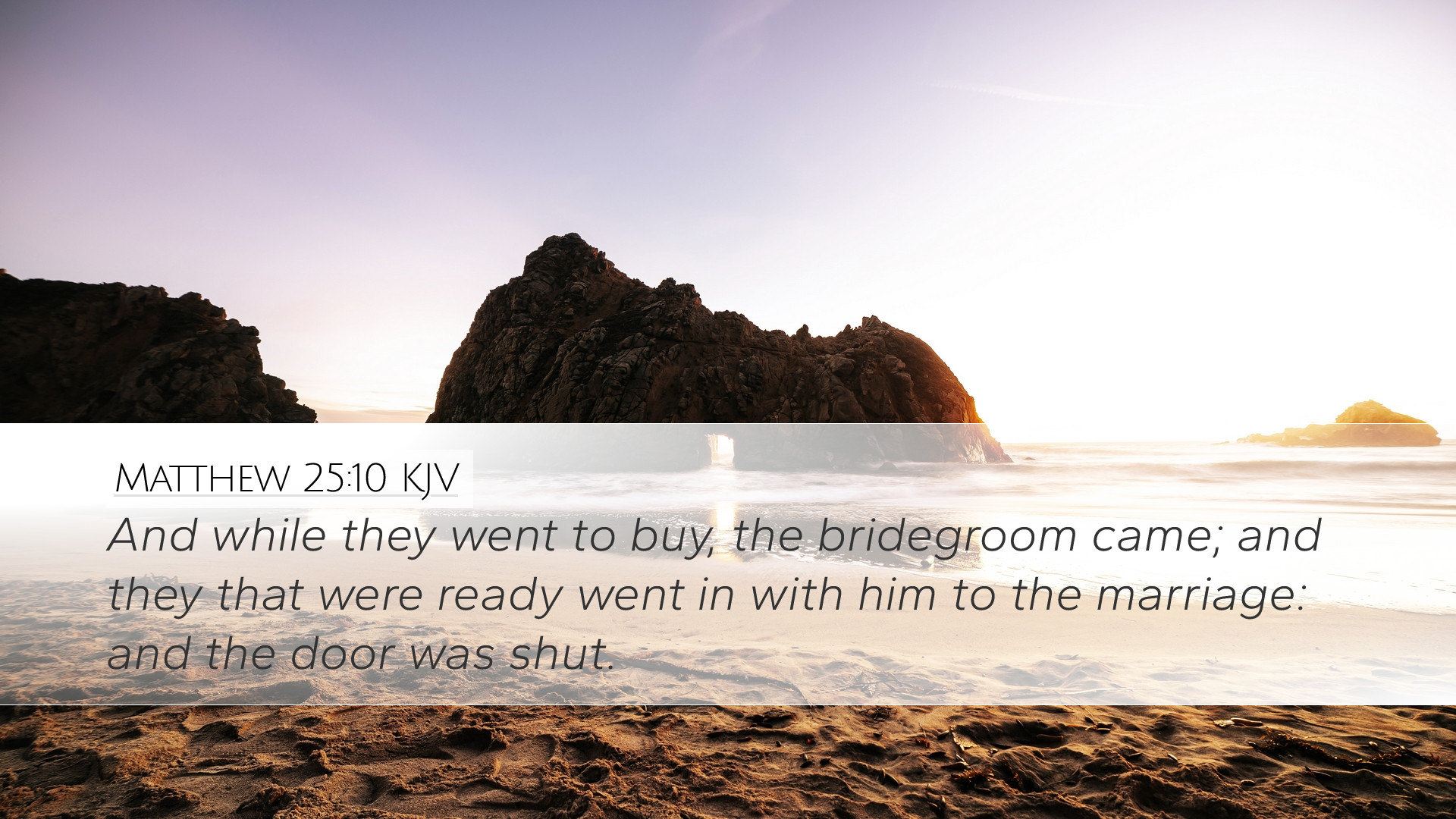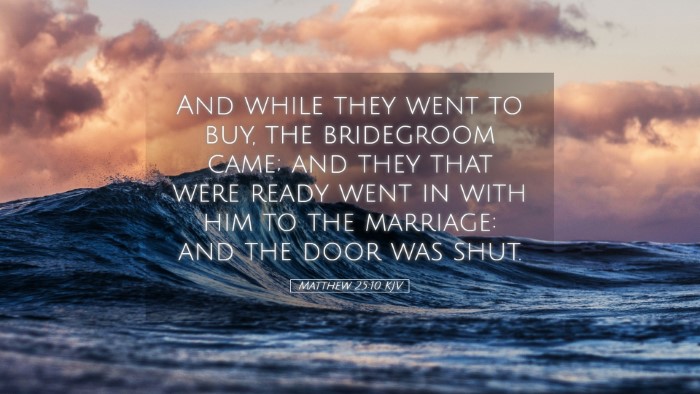Commentary on Matthew 25:10
Matthew 25:10 states: "And while they went to buy, the bridegroom came; and they that were ready went in with him to the marriage: and the door was shut."
Introduction
This verse is part of the Parable of the Ten Virgins, which emphasizes the necessity of preparedness in anticipation of the coming of Christ. The context of the parable speaks volumes about the realities of spiritual vigilance and the consequences of procrastination in one’s spiritual duties. It serves as a warning for Christians regarding the return of Christ, urging them to be ready.
Exegesis of Matthew 25:10
In this verse, the bridegroom represents Christ, while the ten virgins symbolize the members of the church. The five wise virgins, who brought extra oil, signify those who are spiritually prepared, whereas the foolish virgins, who lacked oil, represent those who are unprepared.
Contextual Analysis
To fully appreciate this verse, it is critical to consider the preceding verses where Jesus illustrates the importance of being watchful. The arrival of the bridegroom is sudden, underscoring the unexpected nature of Christ's return, which is a recurring theme across the Gospels (Matthew 24:44).
Key Themes
- Preparedness: The urgency of spiritual preparation is a central theme. The wise virgins' readiness stands in stark contrast to the foolish ones, highlighting that preparation is not a one-time event but a continuous state of being.
- Judgment: The closing of the door signifies a moment of judgment. The wise are welcomed into the feast while the unprepared are left outside, symbolizing the consequences of spiritual negligence.
- Grace and Opportunity: There is a strong message about the grace offered prior to the bridegroom’s arrival. The opportunity to be ready is given, yet it is ultimately up to each individual to heed the call.
Commentary Insights
Matthew Henry's Commentary
Matthew Henry emphasizes that this parable warns believers not to be complacent. He notes that the preparation of the wise virgins was not merely about having oil, but about maintaining a relationship with the bridegroom, signifying the importance of true faith and spiritual alertness. Henry also highlights the dreadful reality of being shut out, affirming that the door represents a final opportunity that will someday close.
Albert Barnes' Notes
Albert Barnes interprets the arrival of the bridegroom and the closing of the door as a representation of the end of the world. He reflects that the time of grace will eventually be over, and those who were unprepared will be left without recourse. Barnes also indicates that oil is a metaphor for the grace of God, which cannot be borrowed. Each believer must cultivate their relationship with God individually, emphasizing personal accountability in discipleship.
Adam Clarke's Commentary
Adam Clarke elaborates further on the symbolism of the oil. He states that the oil represents the Holy Spirit and the grace bestowed upon believers. Clarke warns against the dangers of assuming one can rely on the spirituality of others, advocating for a personal and active engagement with one's faith. The urgency of the parable’s message is clear—one must be diligent and proactive in spiritual matters, as the time of decision will inevitably come.
Theological Reflections
This passage serves as a significant theological reflection on eschatology, the end times, and personal holiness. It poses critical questions for the church today:
- Are we, as the body of Christ, actively preparing for the second coming?
- Do we understand the importance of personal responsibility in our faith journey?
- How do we evangelize others with the understanding that time is limited?
In a modern context, believers are challenged to consider what it means to be spiritually prepared in an age filled with distractions. The story urges a return to authentic living that aligns with the teachings of Christ.
Conclusion
Matthew 25:10 encapsulates a dire warning wrapped in a parable. It is clear that when Christ returns, the readiness of His followers will determine their entrance into eternal fellowship with Him. The observations from Matthew Henry, Albert Barnes, and Adam Clarke reinforce the necessity of individual vigilance, personal accountability, and the vital relationship with Christ that all believers must cultivate.


